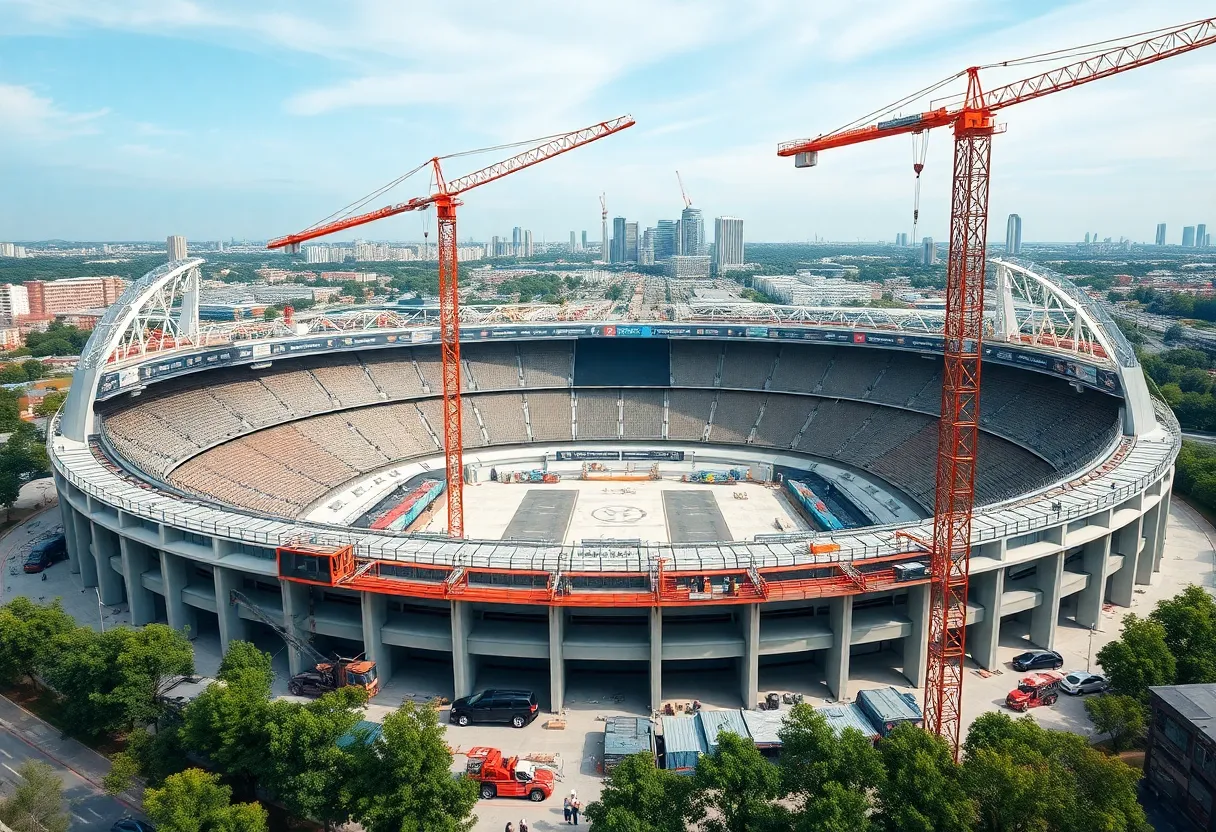News Summary
The Berlin Senate approved a new stadium and redevelopment of Friedrich-Ludwig-Jahn-Sportpark, raising asbestos concerns and public opposition.
New Stadium Plans Spark Asbestos Concerns in Berlin
The Berlin Senate made headlines on May 13, 2025, when it approved an ambitious urban development plan for the much-anticipated new stadium and the comprehensive redevelopment of the Friedrich-Ludwig-Jahn-Sportpark complex. This large-scale project aims to enhance sports facilities in the city, featuring a stadium with a capacity of 20,000 seats, an indoor sports hall, a meeting center for various sports organizations, and multiple fields catering to different sporting disciplines.
While the project sounds promising, it comes with its share of controversies. The redevelopment plan, while making efforts to preserve the existing gymnastics meadow and the beloved avenue of plane trees, has sparked public outcry. A significant concern arose when asbestos was discovered during the demolition of the current stadium’s western stand, leading to the improper storage of asbestos-containing waste near Mauerpark.
Legal Struggles and Environmental Considerations
The presence of asbestos prompted the citizens’ initiative Jahn-Sportpark to file a complaint against Berlin authorities, highlighting their concerns regarding the handling of hazardous materials. Despite the project’s environmental protection requirements being met and adherence to species protection laws, the exposure of dangerous substances has raised alarms among local residents.
Senator Christian Gaebler estimates that the full cost of the new sports complex could reach a staggering €263.4 million, substantially exceeding the original budget. In a bid to keep expenses below the €300 million mark, certain elements of the project plan have been minimized, adding to the growing discontent in the community.
The construction phase for the new stadium is scheduled to commence in 2026, contingent on the final approval of the urban development plan and the complete demolition of the outdated GDR-era stadium. The completion date is projected for 2028, with remaining project elements anticipated to wrap up by 2030.
Public Opposition and a Significant Milestone
Opposition to the redevelopment has manifested in force, with a citizens’ initiative gathering more than 14,000 signatures against the project, showcasing the level of dissent within the community. As plans unfold, questions linger about the balance between urban development and the preservation of public health.
Union Berlin Stadium Redevelopment Delayed
Meanwhile, at Stadion An der Alten Försterei, the redevelopment project for Union Berlin has hit a significant snag, with President Dirk Zingler announcing a delay of at least one year. Originally scheduled for the 2025-26 season, the construction was intended to temporarily relocate Union to the iconic Olympiastadion during renovations.
As the ownership of the stadium property has finally transitioned to the club, this marks a significant milestone since its inauguration in 1920. The renovation plans will see the stadium’s capacity swell from 22,000 to approximately 37,500 following the modifications, with grandstands set to be rebuilt and the main stand extended.
The construction timeline will be contingent upon the complete establishment of a new training complex behind the stadium before any demolition begins. Zingler emphasized the need for optimal construction conditions and indicated that the elaborate expansion plans, first introduced in 2017, were delayed primarily due to the COVID-19 pandemic.
Fan Support and Financial Developments
In a showing of dedication, fans have supported the redevelopment through a subscription period for new shares in Stadionbetriebs AG, with the share capital now exceeding €30 million. The projected expansion aims to accommodate 40,500 spectators while raising an additional €60 million through share issuance compared to a previous initiative in 2011 that saw over 5,000 members contribute to constructing the main stand.
Notably, the redevelopment is primarily funded through the club’s own resources, benefiting from the strong financial position and credit capacity of Union Berlin. As the renovations proceed amidst delays and public scrutiny, the future of both stadiums remains a focal point of civic interest and urban development strategy in Berlin.
Deeper Dive: News & Info About This Topic
HERE Resources
Asbestos on the Battlefield: Russian Forces Reinforce Vehicles Amidst Intense Fighting in Chasiv Yar
Health Crisis for USS James E. Kyes Veterans Due to Asbestos
USS New (DD-818): A Legacy of Valor and Asbestos Dangers
City Council Approves Asbestos Abatement for Historic Centennial Hall
Unlocking the Mystery of Malignant Pleural Mesothelioma Linked to Asbestos Exposure
Intense Battles Rage in Chasiv Yar: The Strategic Fight for Donetsk Oblast
Western MacArthur’s Asbestos Legacy: A Hidden Crisis Unveiled
Recent Legal Victory for Mesothelioma Victim Against Asbestos Company
The Asbestos Trial’s Dramatic Unfolding Continues in Bloemfontein
Unveiling the Hidden Dangers: The USS Rich’s Asbestos Legacy
Additional Resources
- StadiumDB: Berlin Senate Approves Jahn-Sportpark Redevelopment
- Wikipedia: Jahn-Sportpark
- Stadium Business: Union Berlin’s Stadium Project Delayed
- Google Search: Union Berlin Stadium Redevelopment
- Bulinews: Union Berlin Stadium Redevelopment Plans
- Google Scholar: Stadium Redevelopment Berlin
- StadiumDB: Union Berlin Unveils Stadium Renovation Project
- Encyclopedia Britannica: Stadium Renovation



















